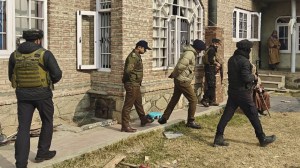Two newcomers jolt parties’ status quo
The Democratic and Republican establishments and their presidential candidates...

The Democratic and Republican establishments and their presidential candidates, Hillary Rodham Clinton and Mitt Romney, were brought low in Iowa on Thursday night, shaken seriously by two national newcomers who won decisively on messages of insurgency and change.
The victors in Iowa, Barack Obama for the Democrats and Mike Huckabee for the Republicans, are as far from the status quo as possible. One is the son of a Kenyan father and a white Kansan mother who entered the US Senate just two years ago. The other is a former Baptist minister who was best known until recently for losing over 100 pounds and taking on the issue of childhood obesity.
The two winners burst the aura of strength and confidence that Clinton and Romney had tried to cultivate for months, and left both parties suddenly without a clear path to their nominating conventions, let alone November.
Clinton’s loss was especially glaring: her central strategy for much of 2007 was to appear as the inevitable nominee, but Iowans shredded that notion. She tried in recent weeks to convince voters that another Clinton administration could be an agent of change, but Iowans did not buy it.
Without question, Clinton and Romney have the money, the campaign apparatus and the legions of supporters to stay in the hunt for the nomination and to right their campaigns. But Clinton’s lacklustre finish raises anew questions about her electability, and whether independent voters — who flocked to Obama — will ever come around to her.
And Romney, who outspent Huckabee 6-1 in television advertising in Iowa, now faces a far more crowded field of rivalsin the New Hampshire primary who are eager to tear into his wounded candidacy
All the candidates now move to that primary on Tuesday, which Clinton had tried to make a fire wall for her campaign, as it was for her husband’s presidential candidacy in 1992, when he finished strongly in second place.
“If Hillary doesn’t stop Obama in New Hampshire, Obama is going to be the Democratic nominee,” said Robert Shrum, a Democratic consultant who was John Kerry’s senior strategist in 2004.
Clinton advisors declined to say if she would now pursue a different strategy against Obama. But a shift seems likely now that Clinton’s multilayered, sometimes contradictory message — offering an experienced hand but also an agent of change fell flat in this first contest.
“We built a campaign for the long haul — we feel very good about our operation in New Hampshire, and polling has us up,” said Howard Wolfson, a Clinton spokesman. The danger for Clinton, of course, is that those polls may not hold after the outcome in Iowa.
Further undercutting Clinton, Obama peeled away broad swaths of women from her base of support, and the political potency of baby boomers fell apart in Iowa. Half of the Democrats under 45 said their first choice was Obama according to a poll by Edison/Mitofsky of voters entering caucus sites.
At the same time, that so many Iowa Democrats voted for an African-American man and a white woman was historic as well. For Obama, especially, the ratification of his candidacy by Democrats and independents in a predominantly white and rural state suggests that he may be able to build a broad and multiracial coalition in his bid for the White House.
The nomination fights will only intensify from now, though the steel that Huckabee will deploy in the battle is unclear. He seemed to come out of nowhere — an ex-governor who was so little known among Republicans that many of them could not even name the state he once led (Arkansas) — and turned from asterisk-status to giant-slayer in spite of a paltry political organisation, slim dollars, and a final week marked by gaffes.
Huckabee enjoyed substantial political support from evangelical Christians, and took advantage of a muddled Republican presidential field to drive toward a victory over Romney.
For Romney, his loss here will register as a deep blow to his candidacy — a failure bound to worry establishment Republicans and wealthy donors who have viewed him as their man.




- 01
- 02
- 03
- 04
- 05



























